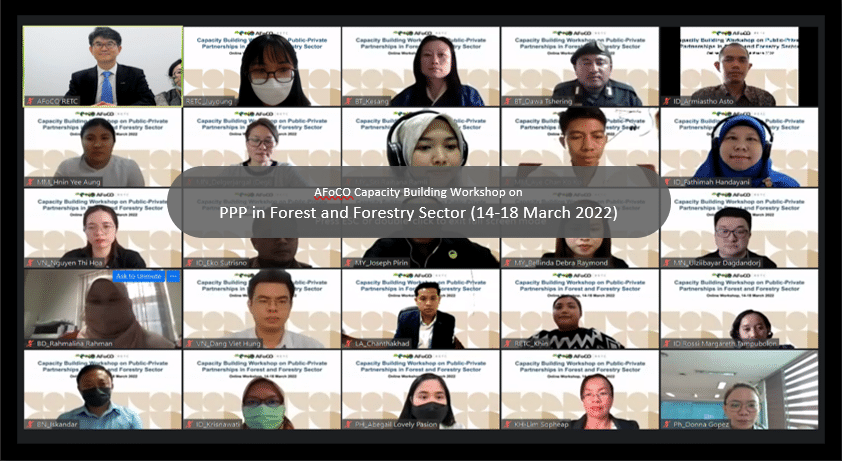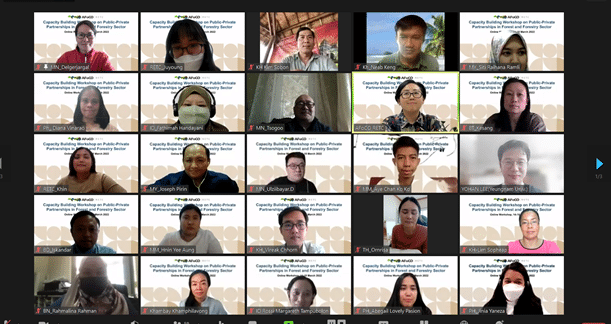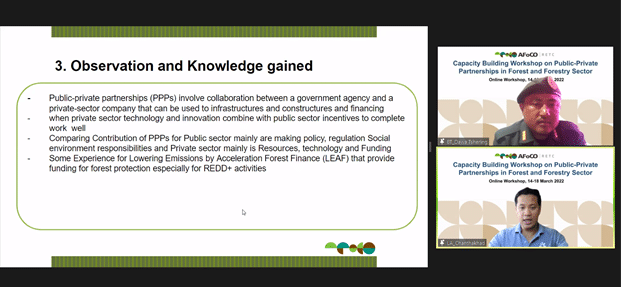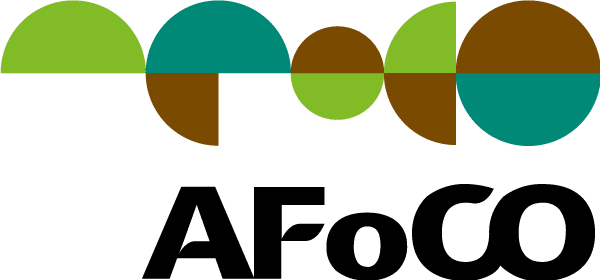Public-Private Partnerships (PPPs) are used by governments to procure and implement public infrastructure and/or services using the resources and expertise of the private sector. In a typical PPP arrangement, one or more private sector entities fund most programs. Technologies and knowledge of both public and private sectors are also shared to maximize public goods.
Forest land in Asia is mostly owned, controlled, and supervised by the public sector. Accompanying various aims and commitments to offer carbon emissions and achieve net-zero goals, forests and the forestry sector emerged as one of the target areas of PPPs, including areas such as REDD+, Payments for Ecosystem Services (PES), and community-based enterprise development, among others. Despite these endeavors, PPPs is still largely unexplored and vague, hence making it difficult for private sector entities to find entry points. On top of leaning on the essence of PPPs, it is time to actively develop ways of promoting local communities’ interests and their active participation through all-inclusive policies and enhanced governance framed by equitable stewardship and benefit-sharing.
In this sense, the “AFoCO Capacity Building Workshop on PPP in Forest and Forestry Sector”, with the aim of providing an understanding of PPPs in forests and the forestry sector, was organized from 14 to 18 March 2022. The training welcomed 60 participants from 14 AFoCO member countries. With all the accumulated knowledge and experiences received, the workshop will encourage the improvement of forest-based PPPs in AFoCO Member Countries and also support the newly endorsed initiative on public-private partnerships at the 5th Session of the Assembly, namely “Green Partnership.”
In his opening remarks, Dr. Lee Yeongjoo, Head of AFoCO RETC, highlighted the importance of PPPs and the requirements for global cooperation to solve the severe climate crises and the worldwide disruptions caused by the pandemic. “Post-COVID-19 economic recovery plans of the member countries will also affect how well each country will do its part to reduce the effects of climate change. AFoCO believes that the forest and forestry sector will safeguard by its broad range of providing vital services. This workshop aims to maintain socio-economic functioning and human well-being,” said Dr. Lee.
The workshop consists of five sessions: 1) Global and Asian Trends on PPPs in Forest and Forestry Sector, 2) Policy Instrument to Facilitate PPPs in Forest and Forestry Sector, 3)Environmental, Social and Corporate Governance (ESG) in PPPs in Forest and Forestry Sector, 4) Role of a Private Sector to REDD+ and 5) Roles of the Local and Civil Society for PPPs in Forest and Forestry Sector, which were led by renowned lecturers from universities and international organizations.
The workshop was designed with a focus on the 4Cs — Communication, Collaboration, Critical thinking, and Creativity. During the workshop, participants were grouped in pairs to work on the development of action plans and promote the sharing of knowledge among AFoCO member countries.
On the first day of the workshop, the participants presented their country’s organizational structure of the government of the forestry sector; national policies, legal framework, strategies related to the PPP; experiences, projects, ; main challenges and issues regarding PPPs. During the country presentation, the participants also shared their expected knowledge from the workshop with 1-2 open questions.



Contributed by Yang Juyoung Yang, Intern

